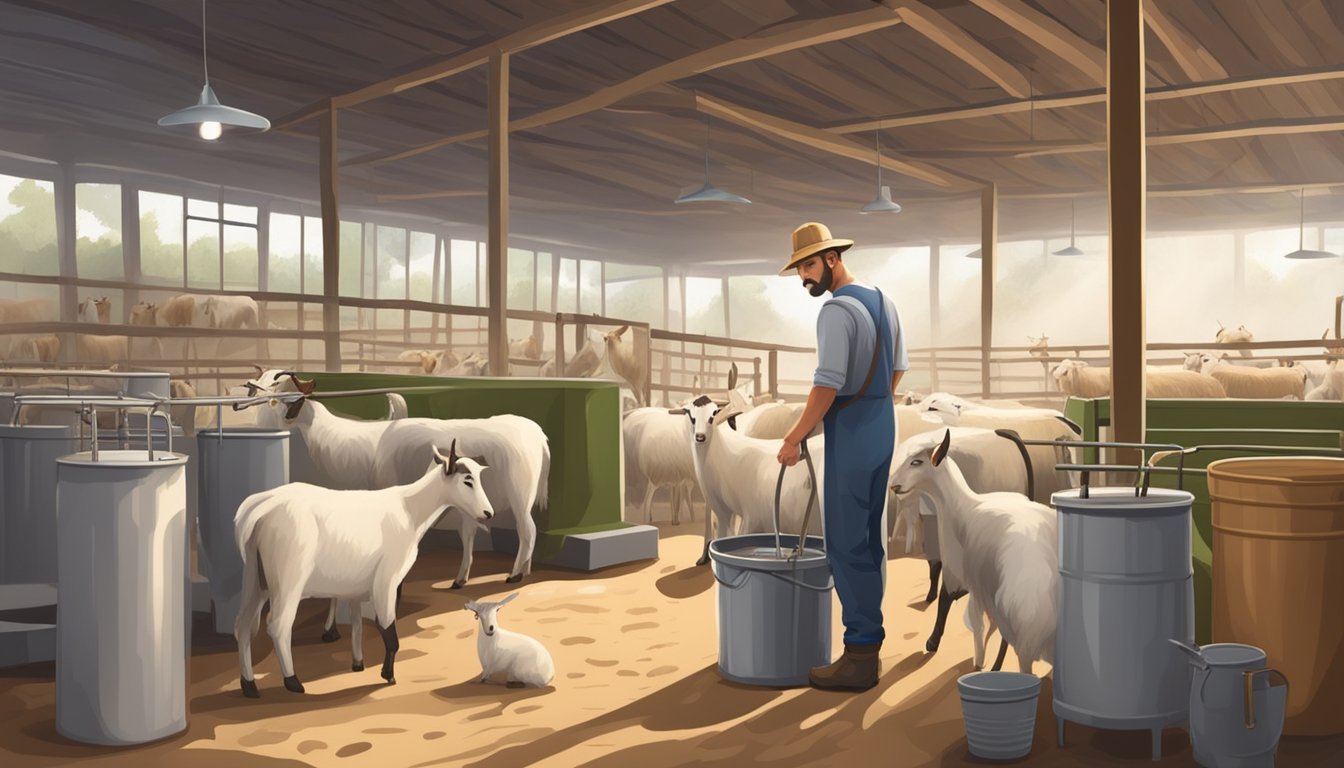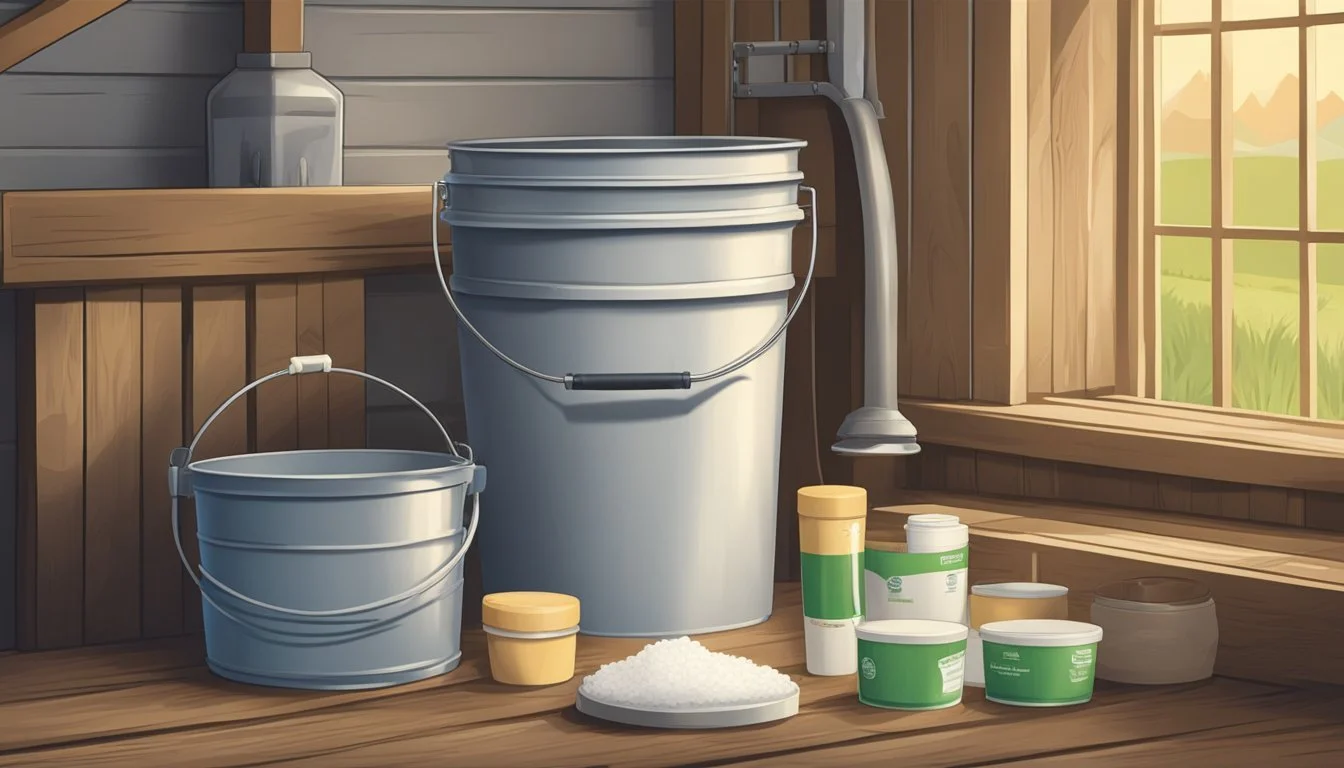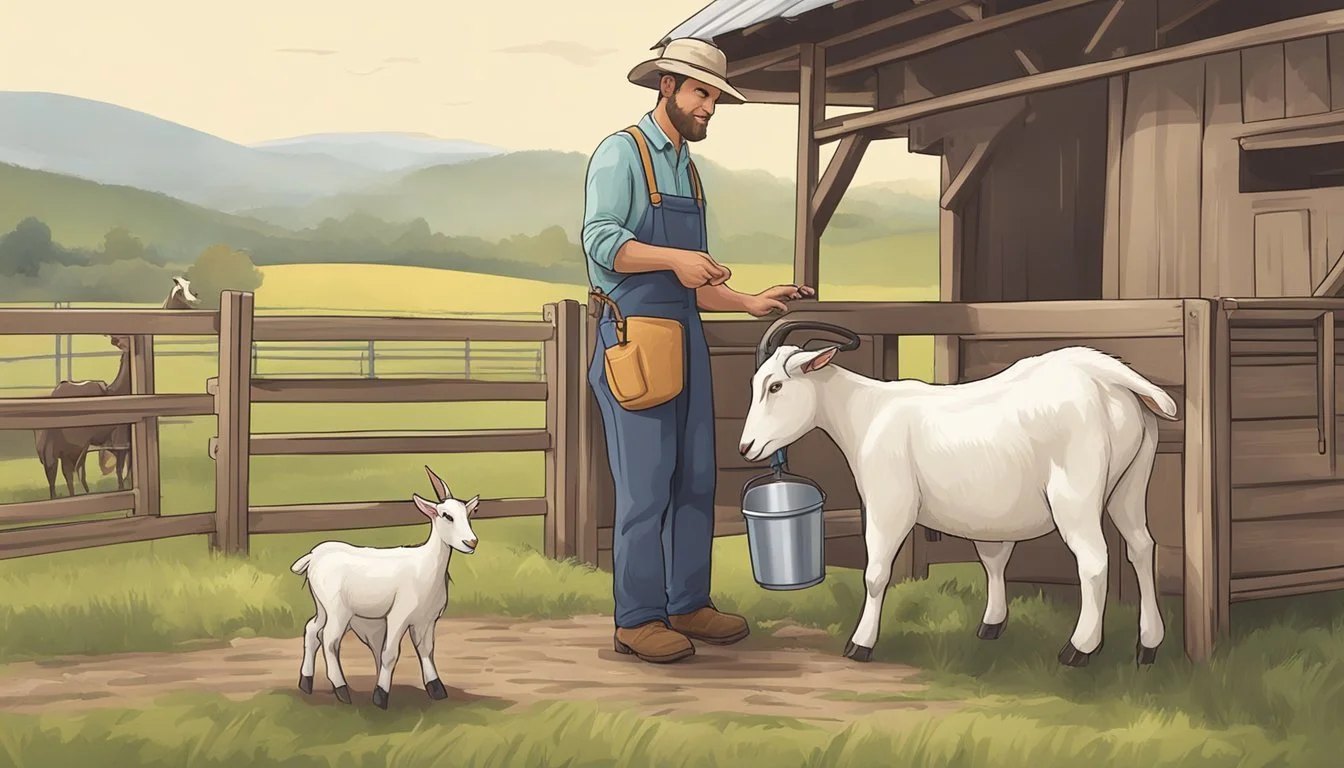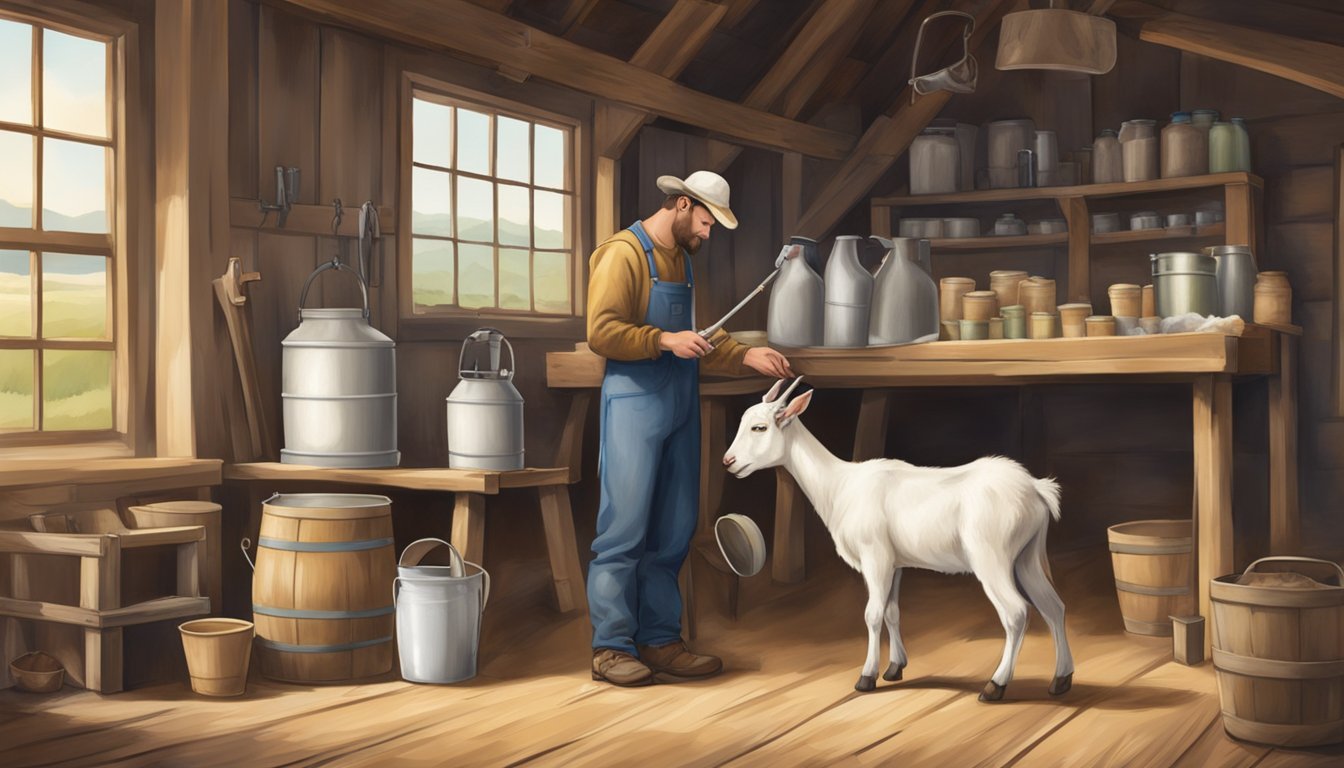The Best Goat Milking Accessories for Small-Scale Farmers
Essential Tools for Efficiency
Small-scale goat farming is a multifaceted venture that requires the right tools to ensure efficiency and animal well-being. Milking goats is a core activity that can be labor-intensive and time-consuming without the proper accessories. Advancements in goat milking technology have led to the creation of a variety of tools that can simplify the milking process, from machines that gently extract milk to storage solutions that keep the milk fresh.
Choosing the best goat milking accessories involves assessing the specific needs of both the animals and the farm operation. Accessories that are designed for ease of use, durability, and maintaining the health of the goat herd can transform the milking routine into a streamlined process. For small-scale goat farmers, this translates into a more manageable and productive farm.
Quality milking accessories can also contribute to better milk quality, which is essential for farmers who sell their products or use them for personal consumption. With the right milking machines, udder hygiene products, and storage solutions, small-scale goat farmers can ensure that the milk they produce is not only plentiful but also meets high standards of quality and safety.
Essential Goat Milking Equipment
For small-scale farmers, having the right equipment is crucial for efficient and safe milking of goats. The essential goat milking accessories include a range of devices designed to ensure clean and effective milking processes.
Milking Machines
Goat milking machines are a pivotal component, where the best goat milking machine for a given operation depends on herd size and budget. Electric goat milking machines save time and reduce labor, especially for farmers with multiple goats. For instance, the S Smautop 7L Electric Pulsation Milking Machine is a medium-sized unit that effectively balances efficiency with portability.
Milking Buckets
Milking buckets are a fundamental part of any bucket milking system. They come in different materials; however, stainless steel is often the preferred choice for its durability and ease of cleaning. The Melasty Milking Machines selection - for small to medium-sized farms, offers reliable and sturdy options.
Teat Cups and Claws
Teat cups and claws are critical for gently extracting milk while ensuring the animal's comfort. Claws connect the teat cups to the milk hose and can influence milking speed and efficiency. Most systems come with silicone inflations that line the inside of the teat cups, providing a soft but firm grip on the goat's teats.
Pulsation Systems
A pulsation system is vital to simulate the natural milking process, periodically allowing the teat to refill with milk. An electric pulsation milking machine typically ensures a consistent and gentle milking rhythm, thereby reducing stress on the animal and maintaining teat health. For example, pulsators used in conjunction with a milking machine will periodically release the vacuum, allowing for a safe and animal-friendly milking cycle.
Factors That Influence Milking Machine Selection
When selecting the best goat milking machine, small-scale farmers must consider several critical factors ranging from compatibility with specific goat breeds to maintaining milk quality. Considering these elements ensures operational success and longevity in goat farming.
Compatibility with Goat Breeds
Different goat breeds may require machines with varying features. For example, milking machines that work even for Nigerian dwarfs and other dwarf goats often need to offer adjustable settings due to their smaller size. It is essential that the chosen machine accommodates the comfort of various goat breeds to prevent harm and ensure effective milking.
Operating Speed and Efficiency
A machine's operating speed is crucial for time efficiency, especially when dealing with larger herds. Look for options that can offer fast milking times without compromising the well-being of the goats or the quality of milk. Machines with an adjustable vacuum pump can provide different speed settings, allowing for a faster and yet gentle milking process.
Ease of Use and Maintenance
Ease of use and maintenance cannot be overstated. Farmers should prioritize machines that are easy to clean, as this directly impacts the amount of time spent on after-milking chores. Additionally, a lightweight design and simple assembly or disassembly can make the routine of setting up and storing the machine significantly less labor-intensive.
Hygiene and Milk Quality
The hygiene of the milking process is directly tied to the milk quality. A machine that is easy to maintain and clean will contribute to better hygiene. Elements like pulsation mimic the natural milking action, reducing the risk of contamination. Ensuring that every component is hygienic will uphold the milk's purity, leading to a safer product for consumers.
Upgrades and Accessories for Optimization
For small-scale farmers, the efficacy of goat milking processes can be substantially enhanced with targeted upgrades and accessories. These improvements in equipment can optimize milking efficiency, animal comfort, and milk hygiene.
Vacuum Pumps and Regulators
Upgrading to an adjustable vacuum pump allows a farmer to customize the suction level to each goat’s comfort, which can lead to improved milk letdown. Regular maintenance of these pumps, including the acquisition of spare parts like seals and valves, ensures consistent performance. Installation of a high-quality vacuum regulator will keep the vacuum pressure steady, preventing harm to the teats and maintaining the health of the dairy goats.
Types of Vacuum Pumps:
Diaphragm pump: Robust and easy maintenance
Rotary vane pump: High efficiency and quiet operation
Important Spare Parts:
Gaskets and seals
Motor components
Valves
Hoses and Milk Lines
Milk lines and hoses are critical in transporting milk safely from the teat to the storage container. Using food-grade, flexible, and durable materials ensures the milk's purity is maintained. It is also essential to have a routine in place to clean these lines to prevent the buildup of bacteria. Farmers may keep spare hoses and clamps to quickly deal with any leakages or wear and tear.
Considerations for Hoses:
Material compatibility with milk
Resistance to kinking and cracking
Aftermarket Pulsators and Teat Dip
Aftermarket pulsators can be fine-tuned to mimic natural milking more closely which can be gentler on the animals and help in reducing milking time. For those looking to sustain or improve udder health, investing in quality teat dips post-milking can prevent infections and promote the healing of the skin.
Pulsator Features:
Adjustable pulsation rates
Easy to clean and maintain
Teat Dip Benefits:
Antimicrobial properties
Skin conditioning agents
These upgrades not only advance the milking experience but also contribute to the long-term welfare of the herd and the quality of milk produced.
Materials and Construction
Choosing the right materials for constructing goat milking accessories is vital for durability and hygiene. High-quality materials ensure the longevity of equipment and safeguard the milk from contamination during the milking process.
Stainless Steel vs. Plastic Components
Stainless Steel: When it comes to milking stands and machines, 304 stainless steel is often the preferred choice. Its resistance to corrosion and ease of cleaning make it an excellent material for food-grade applications. In the context of goat milking accessories, stainless steel excels in providing a sturdy, non-porous surface that doesn't harbor bacteria, which is crucial for maintaining milk quality.
Pros:
Hygienic and easy to sanitize
Durable and rust-resistant
Optimal for long-term use
Cons:
Generally more expensive than plastic
Heavier, which could affect portability
Plastic: Components made from high-grade plastic offer an alternative that is lightweight and often less costly than stainless steel. While plastic can be convenient, especially for portable stands and equipment, it is important to ensure that the plastic is food-grade and designed for milking purposes.
Pros:
Cost-effective
Lightweight and portable
Cons:
Can scratch more easily than stainless steel, potentially harboring bacteria
May degrade over time with exposure to sunlight and heavy use
When small-scale farmers are considering materials for their goat milking accessories, they must ponder the tradeoffs between these two options. The choice may hinge on their specific needs, such as the scale of their operations, budget constraints, and personal preferences regarding maintenance and durability.
Practical Tips for Small-Scale Goat Milking
For small-scale farmers, efficient milking practices are essential to maximize milk production and ensure a stress-free experience for both the farmer and the goats. These practical tips can help streamline the process.
Establishing a Milking Routine
Creating a consistent routine for milking is crucial. Goats thrive on habit, so milking at the same times each day minimizes stress and can lead to better milk production. Farmers should choose times that align with the natural lactation cycles of their goats and stick to them as closely as possible.
Manual vs. Machine Milking
When deciding between hand milking and machine milking, consider the scale of your operation and your goals. Hand milking is less expensive and allows for a direct connection with the animals but may not be efficient for larger herds. Machine milking, on the other hand, can save time and is gentler on the hands, but it requires an initial investment and ongoing maintenance and cleaning.
Proper Maintenance and Cleaning
Maintaining and cleaning milking equipment is non-negotiable for the health of the goats and the quality of the milk. After each milking session:
Clean all equipment with hot, soapy water to remove milk residue.
Sanitize all parts that come into contact with milk.
Allow the equipment to dry completely before the next use to prevent the growth of bacteria.
Adhering to these tips can help ensure that milk is harvested in a manner that maintains its high quality, keeps goats in good health, and allows the milking process to be as efficient as possible for the farmer.
The Economics of Goat Milking Accessories
When considering goat milking accessories, small-scale farmers must effectively manage their resources to ensure a balance between cost and quality.
Balancing Quality and Budget
The quest for the best goat milking machine often aligns with the need for sustainable, high-quality milk production. Small-scale farmers view the purchase of a goat milking machine as a significant investment that should yield long-term benefits without stretching the budget too thin. Here are key factors to consider:
Upfront Costs vs. Longevity: It's not just about the initial price; it's about how long the machine will last. A slightly higher upfront cost can be justified if the milking machine offers greater durability and maintenance support.
Efficiency: Time is money. A machine that can milk quickly and effectively may cost more, but it can increase overall farm productivity.
Milk Quality: Substandard equipment can affect milk quality. Therefore, investing in a machine that ensures high-quality milk is non-negotiable.
Maintenance Costs: Factor in the cost of cleaning supplies, replacement parts, and potential repairs. Lower-priced options might have higher maintenance costs over time.
In conclusion, small-scale farmers must weigh the price of goat milking accessories against their potential to enhance milk quality and farm efficiency. Careful research and consideration will ensure that their budget aligns with their goals for high-quality milk production.
Where to Find Quality Milking Supplies
For small-scale farmers, locating the right goat milking supplies is essential to maintain an efficient and hygienic milking process. A variety of quality products are available both in local agricultural shops and through trusted online retailers.
Local Supply Stores vs. Online Retailers
Local supply stores often provide immediate access to milking supplies, allowing farmers to inspect products before purchase. However, the range of items might be limited compared to online retailers. Larger online platforms like Jeffers Livestock boast a wide assortment of supplies, from stainless steel pails to udder wipes. Farmers may also explore specialized online sources like Hamby Dairy Supply, which caters specifically to goat farming needs and offers a larger selection of equipment.
Customer Service and Support
An often overlooked aspect of purchasing supplies is the customer service and support offered by the retailer. Companies renowned for their customer support, such as Hamby Dairy Supply, aid in not only making the right purchase decisions but also provide after-sale assistance. Many online retailers offer detailed product descriptions and reviews, which may be beneficial for farmers making informed decisions from afar. For technical equipment, such as milking machines, having a responsive customer service team can be critical for troubleshooting issues and sourcing spare parts.
Recommended Goat Milking Machines
Selecting the right goat milking machine can help small-scale farmers save time and effort in their daily routines. This section provides insights and reviews on some of the best models suited for different needs.
Review of Popular Models
S SMAUTOP 7L Electric Pulsation Milking Machine: Ideal for small farms, this machine operates with a pulsation cycle that mimics natural milking, ensuring comfort for the goats and preserving the quality of the milk. Its 7-liter capacity is optimal for those handling multiple goats each milking session. See more details on the Melasty Milking Machines - Portable Milking Machinery.
Happybuy Electric Milking Machine: This machine is suited for those who need a compact and portable solution. It's designed with ease of use in mind, and its efficient motor helps minimize the milking time, making it a solid choice for hobbyists or farmers on the go.
Hantop Cow Goat Milking Machine: Hantop's model offers versatility as it is built to accommodate both cow and goat milking. Tailored with user-friendly features and durable materials, it promises longevity and reliability for daily milking tasks.
Hantop 6L Goat Milking Machine: For those with a smaller herd, the Hantop 6L is a perfect match with its smaller capacity and gentle milking action. It's particularly praised for its easy-to-clean design which is crucial for maintaining milk hygiene. View the Hantop 6L on platforms like eBay for a variety of options.
Each model brings its own set of features and benefits, but the common thread is the ability to improve the milking process for small-scale goat farmers, ensuring optimal animal welfare and milk yield.








